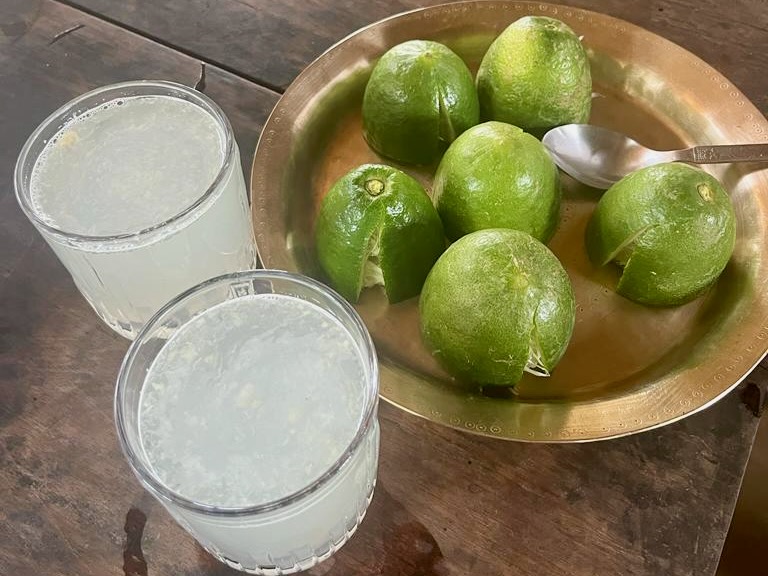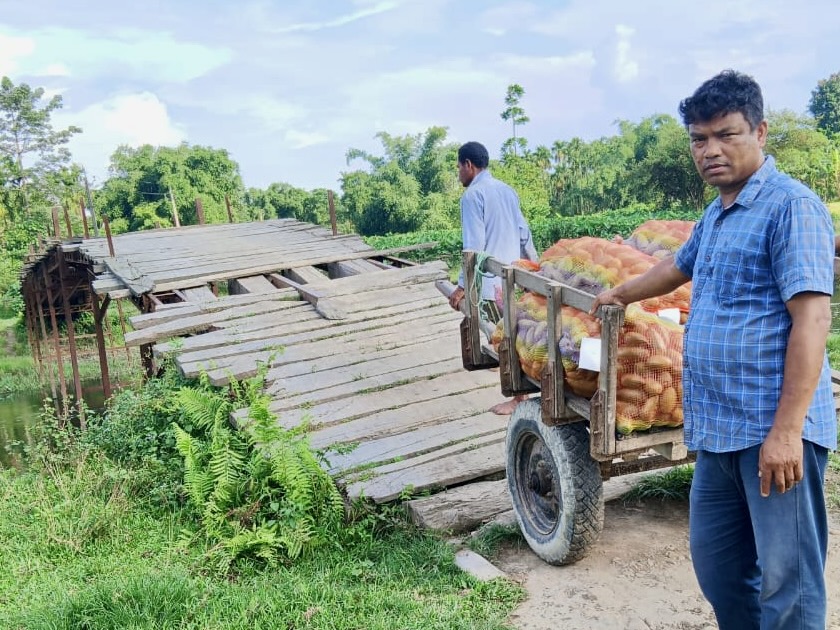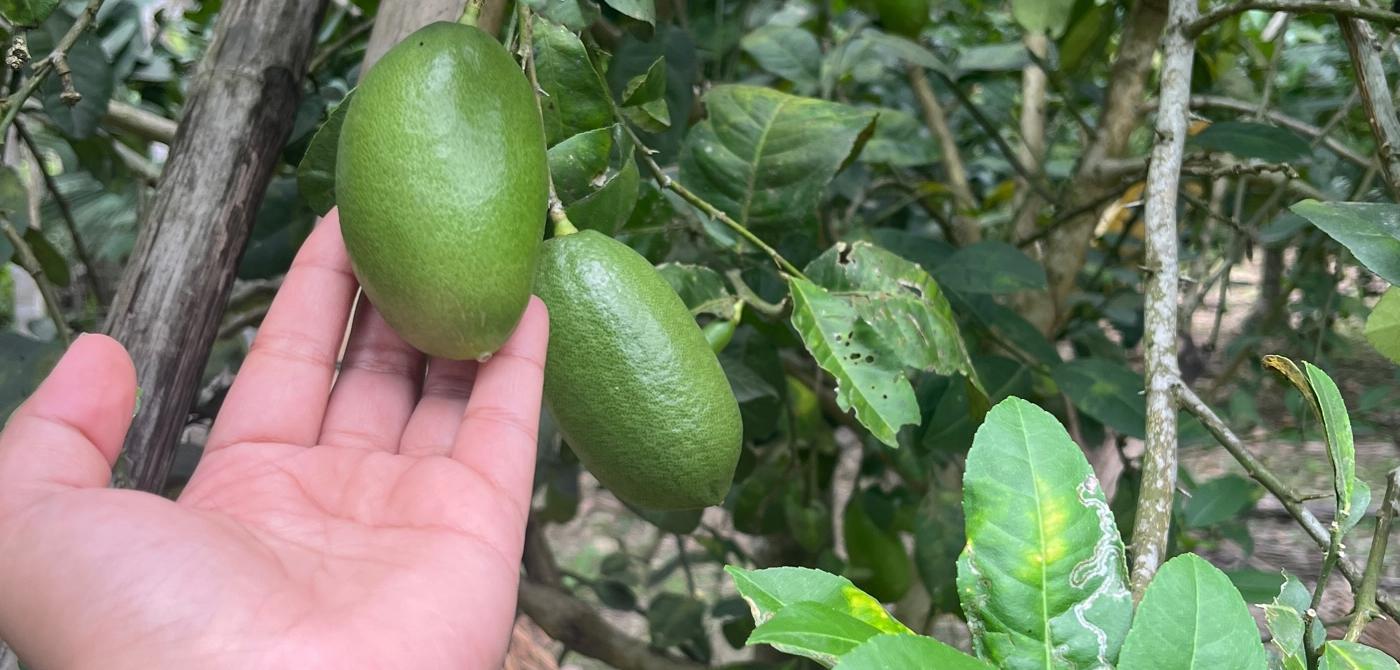Babul Sonowal is famous on the internet as an adarsh khetiok (ideal farmer). He grows kaji nemu, a prized lemon variety with a Geographical Indication tag, in Chandrapur village of Tinsukia district in Assam.
Babul is also a former ULFA guerrilla. We were on our way to see him.
Since 2021, we have followed ULFA guerrillas – active and surrendered – to understand how farming and growing food initiates a process of rehabilitation, care, and hope. Grand policies about development programmes and infrastructure development across Assam and North East India underline how these activities will usher in peace and progress for the region. Yet there is ambivalence about what one must do with the militarisation of the land and inequality.
What does it mean for the guerrillas to be working on fields? As we discover, Babul’s story invites us to reflect on the vicious cycle of structural violence that former guerrilla members and their families continue to suffer, as well as on landscapes like Tinsukia’s, which carry the tag of a ‘disturbed area’. The resilience of the lemon plant and the challenges faced by Babul in drawing the full potential of his lemon orchard are symbolic of the lives of the guerrillas who sought rehabilitation and who, like the kaji nemu, have immense potential and need intervention.
Violent landscapes
Across Tinsukia, the landscape of flowers, lemons, oranges, and tea plantations is etched with memories of violence that humans and other beings have experienced together.
"Slowly, the pukhuris (ponds) and the pothars (agricultural fields) were turned into tea plantations.”
In Kakopathar village, a Moran elder told us how tea plantations had eliminated the native orange trees that were once popular across the district. “Business communities from other states who had settled in Assam would come with sacks of rice, oil, and spices, and in lieu would take away all the oranges.” He continued, “The simple and poor community got elated receiving the commodities that would run their houses for a long time. Slowly, the pukhuris (ponds) and the pothars (agricultural fields) were turned into tea plantations.”
Dixita was on the ill-maintained road from Kakopathar towards Bordumsa, which skirts the Assam-Arunachal Pradesh border. Along the route, farmers ploughed fields under the scorching summer sun. Most houses here had a bari (garden) and a pukhuri within the compound. Purple flowered jacaranda trees stretched across the landscape. Farmers walked their cows for grazing in the mornings. At a weekly haat, traders sold local produce and farming equipment, sweets and savouries, woven fabrics and traditional scarfs.

Her guide for this trip was S, a student from Tinsukia. He was from the Moran community and associated with the students’ wing of a political party active in the district. As Dixita travelled, S recounted places in the district that held a special place in his memory.
Near Kailashpur was a school playground where he had joined the widespread anti-Citizenship Amendment Act (CAA) protests in 2019. Crossing a tea estate, S pointed towards a big house. The place was called Kulapathar. In 2012, the elderly couple who owned the estate was "burnt and killed" by workers. “It happened in that bungalow,” S said. Reports had suggested that the killing was brought about by the ill-behaviour of the husband towards the workers. “If the managers don’t act strict, then the labourers would never work properly,” S commented. The tension between the caste Hindu communities and the Adivasi communities who form the bulk of tea garden labour was evident.
In Bordumsa, S spoke of a police officer who had been shot dead in 2018 by the ULFA (Independent). (The ULFA split into two factions in 2011: one in peace talks with the government and the other, an underground faction called ULFA (Independent) which continued its armed struggle.) The slain officer had been part of an operation against guerrillas hiding in the area. There were strong protests against the ULFA (Independent) after his death. In the next village, S recalled when a 6-year-old boy was killed by the army, sometime in 2009 or 2010 – he couldn't remember precisely when – who suspected that household members had sheltered ULFA cadres at their home.
It was a reminder that Tinsukia was a ‘disturbed area’, subject to the Armed Forces Special Powers Act (1958). Referring to the army's counter-insurgency operations, the Moran elder in Kakopathar said it had become part of their culture to eat their meals squatting – the “posture indicates their readiness to escape at the entry of the Indian armed forces.”
Every village has a story of death – be it of humans, trees, or animals – and there are memorials erected for some of them. How do Babul’s lemon gardens thrive in a deeply militarised and violent place?
Home for lemons
Without a local guide, one can get lost on the track to Babul’s orchard in Chandrapur village. There is no internet connectivity. The narrow and bumpy path goes past the dense jungle and grazing land and over a xaku, a bridge made of bamboo. The road is patchy and can only be travelled by two-wheelers. There are no road markers or milestones. For long stretches, there are no signs of human habitat. There was an eerie silence from the jungle. Dixita could feel that S was following his riding instincts, stopping his motorcycle several times to pick up the trail. At every house they crossed, S asked about Babul.
Chandrapur is home to Ahoms, Morans, Sonowal Kocharis, and a small Nepali community. Most of them know Babul for multiple reasons: his lemon orchard, his association with ULFA, the recent surrender of his guerrilla son, his daughter who was a state-level boxer, his home around which he had established a temple and a grocery shop, the only shop in the area.

Babul’s courtyard is filled with the scent of lemons. He offers us lemonade.
“I came to Chandrapur with a plan to grow tea. I did that on 40 bighas of land. But the produce was not good, and the land was not suitable for tea plantation, so I shifted to areca nuts. But it is mostly kaji nemu.”
In Assam, kaji nemu is cultivated for consumption and livelihood. The lemon is a central ingredient in preparing tenga maas, the popular Assamese sour fish curry. Fresh lemons are also eaten with meals. Increasingly, tarts, cakes, and tea with kaji nemu essence have become popular.
Most of the people in Chandrapur farm the lemon. When Babul shifted to his current orchard in 2008, he borrowed lemon branches from the villagers for transplantation as the kaji nemu variety is seedless. The plant takes around three years to mature and bears fruits round the year. Today, around 500 bighas of land in the village are under lemon cultivation, and daily production goes up to 30,000 pieces. Around 5,000 lemons come from Babul’s orchard alone.
Planting local varieties of fruits and vegetables, growing rice, or practising organic farming mark the revival of memories and living a self-sufficient life in the backdrop of militarisation.
Like many young men who joined the organisation in the 1990s, Babul’s story is also connected to state violence and heightened counter-insurgency operations of that decade.
The ULFA was founded in 1979 with a vision to establish a sovereign, independent Assam and free the land from what they perceived to be the ‘illegal occupation of India’. In 1990, the Indian army launched a counter-insurgency operation against the organisation. Cadres fleeing an army attack on their camp entered Babul’s village. Supporting their cause, he joined the organisation. Five years later, he was arrested from Margherita, where he was carrying out overground work and charged under the Terrorist and Disruptive Activities (Prevention) Act. Babul was in jail for seven months. When he was released, his family insisted he stay back at home. He married without informing the ULFA leadership, breaking the code for guerrillas. Now he wanted to surrender his organisational responsibilities.
Babul’s secret offended the ULFA leadership, and he was ordered to plant 200 saplings as a penalty. As he cared for the 'punishment' plants, he developed an interest in farming. Despite his shift from guns to the garden, the security forces frequently harassed him. Fearing for his safety, he rejoined ULFA in 1998. His wife and two children followed him to escape alleged army atrocities at home. The family got malaria in the jungle and had to come out in 2000. This time, Babul surrendered with ULFA permission. “ULFA dekhibole rangeen, ULFA kora kothin” – ULFA looked fancy, but being in ULFA was tough.
He first helped establish a school at his ancestral home in Imthem. But “town’ot thaki bhal nalage" – it did not feel good living in the town – and he moved to Chandrapur and started working the lemon orchard in 2000 on 50 bighas of land he purchased.
Surveillance by security forces continued to be a challenge. It took him over 10 years to ‘clear his name’ of the charges against him. In 2017, Babul’s son joined ULFA (Independent). “When he was underground, both his mother and I were in jail for three months,” Babul said. “In 2021, I got Covid and was hospitalised for a long time. I thought I would die after having trouble breathing. I got very anxious and started losing hope of survival. It was our daughter who stepped into the hospital ward at her own risk and motivated me. She also called up our son, saying I had little time left and might not make it,” Babul said.
In September of that year, his son surrendered. Babul returned to the orchard with renewed hope and purpose.
Dreams of freedom
For guerrillas, both surrendered and those part of a ceasefire agreement, planting local varieties of fruits and vegetables, growing rice, or practising organic farming mark revival of memories and living a self-sufficient life against the backdrop of militarisation. The cooperative societies that many such guerrillas have registered their farms and orchards as draw our attention towards the everyday lives of guerrillas who are trying to reintegrate into society as they reflect on the dreams of sovereignty and freedom. Like Babul, they are concerned about caring for their plants and finding links for the produce to make it to the local markets.
"What will the boys from here do? Whenever they get the chance to join the ULFA, they will do that [...] When people are busy, or get work, they would never join the insurgency."
Babul recalled a conversation with an army man in 2021 when his son – and many other young people in Assam – was with the ULFA(I).
Why would people not go to ULFA? We don’t even have a school here. There is no college, no road, and not a single hospital. You might have come from Delhi to serve in the army. You may have come from Guwahati. You may have come from Uttar Pradesh. You tell me, where will the people from here go? What will the boys from here do? Whenever they get the chance to join the ULFA, they will do that. No one can stop these recruitments. This had led to tremendous loss of human resources. When people are busy, or get work, they would never join the insurgency. If someone tells me to go to ULFA today, how can I go? The affection of my lemon fruits ties me down.
The kaji nemu is part of an integrative rehabilitation model promoted in western Assam. This implies that rehabilitation (of animals) and restoring peace (among communities) in post-conflict societies are inter-connected processes and ensure human-animal co-existence. Apart from being a source of food, the lemon trees are also planted as bio fences to keep away elephants in the Bodoland Territorial Autonomous Districts and Goalpara district, where the elephant corridors have shrunk due to deforestation and expansion of roads and human settlements.
But any venture with lemons is difficult. There are infrastructural challenges to finding a market for the fruit. Apart from the inconvenient roadways and the transport facilities, villagers suspect that changing climatic conditions have altered agricultural patterns. At a time when the kaji nemus have been exported abroad by some farmers, several challenges add to Babul’s growing frustration with the supply chain system on the ground. While Babul can carry his lemons to the Dibrugarh market, other villagers sell their produce at the local market in Jagun, often at a loss.
It is a long trip from Babul’s orchard to the market in Dibrugarh.
He and his workers must cart the lemons to a halfway point and load them onto an auto rickshaw. The rickshaw crosses the Burhi Dihing river on a ferry and drops them off at Dibrugarh.

Walking through Babul’s orchard resembles the lemon tours organised for tourists on the Amalfi Coast in Italy. Babul’s orchard is like a garden of memories where he cares for the lemons. At times when North East India boasts of ecotourism, and homestays, exploring ways to collaborate with Babul’s lemon orchards means celebrating the indigenous fruits and vegetables from the region and a welcome step both towards agricultural promotion as well as a sustainable model of rehabilitation for societies healing after conflicts. Babul’s lemon orchard is organic, the trees can withstand floods, and is a perennial crop that sustains households in the village. He says lemons require minimum efforts, and plants do not need much water. This experience stands in contrast with the promotion of palm oil cultivation across Assam as a lucrative cash crop, a plant that requires high water consumption.
"People have to change with the changing times. Perhaps I have changed too."
Like the guerrilla farmers, the lemons too yearn for a home where they are savoured and appreciated for their taste. Eating kaji nemu in Assam is an act that has emotional and cultural significance. The community's production and consumption of kaji nemu exceeds treating it as a mere commodity.
Connecting to the land and cultivating crops gives Babul enough time to introspect about life and his orchard. Realising the disconnect with the traditional ways of farming, Babul said, “Today people have become materialistic. They identify only money. Well, people have to change with the changing times. Perhaps I have changed too. I would rather grow lemons and earn Rs 6 lakhs annually than the grains which would bring me only Rs 50,000. I have to spend equal amount of time and efforts on both the crops, and moreover, the state government offers free rice to every low-income household. This makes it easy to choose the lemons. However, taking these decisions question our conscience and morality.”
(This essay is part of an ongoing research on food sovereignty in the Eastern Himalayan region funded by the Swedish Research Council. We thank the student guide, Babul Sonowal and his family, and our team members for sharing their time, knowledge, and insights. The trip described was made in June 2023.)
Dixita Deka is a postdoctoral fellow at North Eastern Social Research Centre, Guwahati. Dolly Kikon is an anthropologist teaching at the University of Melbourne.











